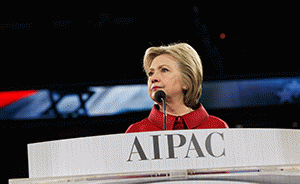The memo never even mentions the problem of al-Nusra Front and the risk that the use of U.S. force to change the military balance between the opposition and the regime would risk an ultimate victory by the jihadists.
One point in the memo sounds very much like an argument intended to be leaked to the media in order to dramatize the case for war against the Assad regime. "None of us see or has seen merit in a large-scale US invasion of Syria or the sudden collapse of existing Syrian institutions," it says.
Since no one in the administration is advocating a "large-scale US invasion" or the "sudden collapse" of the Syrian state, that sentence was clearly calculated to influence public opinion rather than to convince anyone in the State Department of the need for the use of force.
Kerry made no effort to hide his pleasure with the "Dissent Memo," telling a reporter on June 20 that the memo was "good" and that he intended to meet with its authors. His spokesman John Kirby said he would not characterize Kerry's comments as "indicative of a full-throated endorsement of his views" in the memo -- an obvious hint that it was consistent with Kerry's views.
Kirby went on to say that State Department is "discussing other alternatives, other options, mindful ... that the current approach is, without question, struggling." After Kerry's meeting with 10 members of the group on June 21, Kirby refused to say whether Kerry agreed with the signatories, citing the need "to respect the confidentiality" of the "dissent channel" process.
Clinton Group Backs Memo
The leak of the memo coincided with the advocacy of the same military option by a Washington think tank with ties to Hillary Clinton. On June 16, the very day the New York Times published the story of the leaked memo by State Department officials, the Center for New American Security (CNAS) released a report on a study group on defeating the Islamic State that called for a U.S. policy to "threaten and execute limited strikes against the Assad regime," to signal to Assad as well Russia and Iran that it is "willing to get more engaged." The same report called for dispatching "several thousand" U.S. troops to Syria.

Former Secretary of State Hillary Clinton addressing the AIPAC conference in Washington D.C. on March 21, 2016.
(Image by (Photo credit: AIPAC)) Details DMCA
The study group was co-chaired by CNAS co-founder Michele Flournoy, formerly third-ranked Defense Department official, although the report was written by lower-level CNAS staff members. Since leaving the Obama administration in 2009, Flournoy has been critical of its defense policy and is now regarded as the most likely choice for Defense Secretary in a Hillary Clinton administration.
Clinton is clearly sympathetic to the military option in the leaked memo. The timing of the appearance of both documents immediately after Clinton had clinched the nomination suggests that the bureaucratic figures behind the push for a new war in Syria are seeking to take advantage of the Clinton presidential run to build public support for that option.
(Note: You can view every article as one long page if you sign up as an Advocate Member, or higher).





